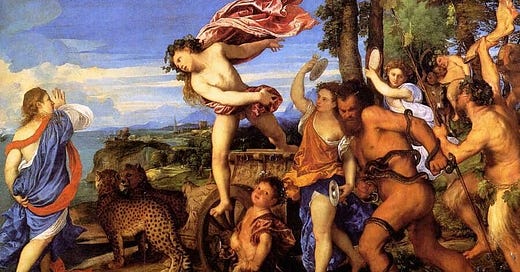The Greek tragedy, The Bacchae, is intensely emotional, triumphantly violent, and thoroughly pagan. Euripides dramatizes the vengeance of the young god, Dionysus[1], in his quest to prove his divine status to his countrymen. Dionysus’s unique origin poses a problem for his Theban relatives. He was born from a mortal woman and Zeus, but was sown into Zeus’s thigh to protect him from Hera’s jealousy. This act of preservation on Zeus’ part made Dionysus a full god, rather than a demigod like his famous half-brothers, Heracles and Perseus.[2]
The chief conflict of the play is between Dionysus and his cousin, King Pentheus. Pentheus does not recognize the legitimacy of this new god and his foreign ways. In fact, he is scandalized that the cult of Bacchus has brought such madness to his city. Dionysus has caused a frenzy amongst the women of Thebes. They have left their stations as wives and mothers and are engaging in unsavory Bacchian activities outside of town.
The play culminates in Dionysus’s revenge. He overcomes Pentheus’s reason, leads him out to the worshipers, and causes the worshipers, led by Pentheus’s Mother, to murder Pentheus brutally.
What did Euripides aim to teach us today through such violence and chaos? There is an ongoing debate about whether Euripides was critiquing religion in general, religious fanaticism, or the newer religions of his time. Nevertheless, Euripides’s Dionysus is as chilling as he is memorable.
So it would shock readers familiar with this Dionysus to find him appear in the second book of C.S. Lewis’s Chronicles of Narnia.[3] He is introduced as:
a youth, dressed only in a fawn-skin, with vine-leaves wreathed in his curly hair. His face would have been almost too pretty for a boy’s, if it had not looked so extremely wild. You felt, as Edmund said when he saw him a few days later, “There’s a chap who might do anything – absolutely anything.
Lewis continues:
Bacchus … and the Maenads began a dance … and where their hands touched, and where their feet fell, the feast came into existence.
Thus Aslan feasted the Narnians till long after the sunset had died away, and the stars had come out … And the best thing about this feast was that there was not breaking up or going away, but as the talk grew quieter and slower, one after another would begin to nod and finally drop off to sleep with feet towards the fire and good friends on either side.
In the story, Susan summarizes her experience with Dionysus by saying, “I wouldn’t have felt very safe with Bacchus and all his wild girls if we’d met them without Aslan.”
Indeed, there is a lot about Bacchus that is not safe, which is precisely why Lewis brings him under the control of the True God. Lewis presents for modern Christians a lens through which to view those things that Dionysus represents. It is not that Christians outright reject feast, but rather we reject wild emotionalism untethered to the Logos.
Back to Euripides, a common theme in the Bacchae is that reason must be checked at the door when it comes to the divine. Teiresias, the blind poet who is often the voice of reason in Greek plays, proclaims, “We do not chop logic when speaking of divinity. The traditions of our forefathers that we have inherited, as old as time, shall not be overthrown by any clever argument, though it be devised by the subtlest of wits.”
In King Pentheus’s mind, the Dionysian situation did not make sense. Furthermore, the worship of Dionysus caused an emotional frenzy. Perhaps Euripides believed that the Greek religion was becoming a religion more of emotion than of logic. Perhaps Euripides wanted to show the dangers of irrational emotionalism, especially within religion.
Perhaps Euripides was on to something. So then, how does Christianity domesticate Dionysus? For this, we must look to the true God of Wine. If Dionysus leads people away from their senses and makes them bestial, the Logos, Christ Jesus, does the opposite. We find Jesus in John 2 showing that he has come to bring new wine that will not only fulfill the old vats of Judaism, but also fulfill the longings of the wayward Greek hearts.
Christ comes to his own, and his own received him not, but rather than pursuing vengeance, he continued his ministry of reconciliation even to the point of death on a cross. His brothers are not convinced of his deity through force, but rather through his death, burial, and resurrection.
Christ came not to abolish emotions, but rather to tether them to truth. Like David dancing before the Lord, Believers today are able to experience true joy. And we find that joy in the feast provided for us at the table of our Lord.
[1] Also known as Bacchus, Bromius, and Evius.
[2] Zeus produced many demigods and this is not the first time that a child has been said to emerge from Zeus’s body. Athena burst from his head.
[3] The publication order is the correct order.




Ryan, what’s great perspective that I have never made the connection on. So thankful for how you demonstrate that the gospel of Jesus reaches both Jew and Greek alike. Thanks!
“In John 2, we see Jesus revealing that He has come to bring new wine—wine that not only fills the old jars of Judaism, but also satisfies the deep thirst of wandering Greek hearts.”
Stunning line. It stopped me cold. So glad your voice is now on Substack.